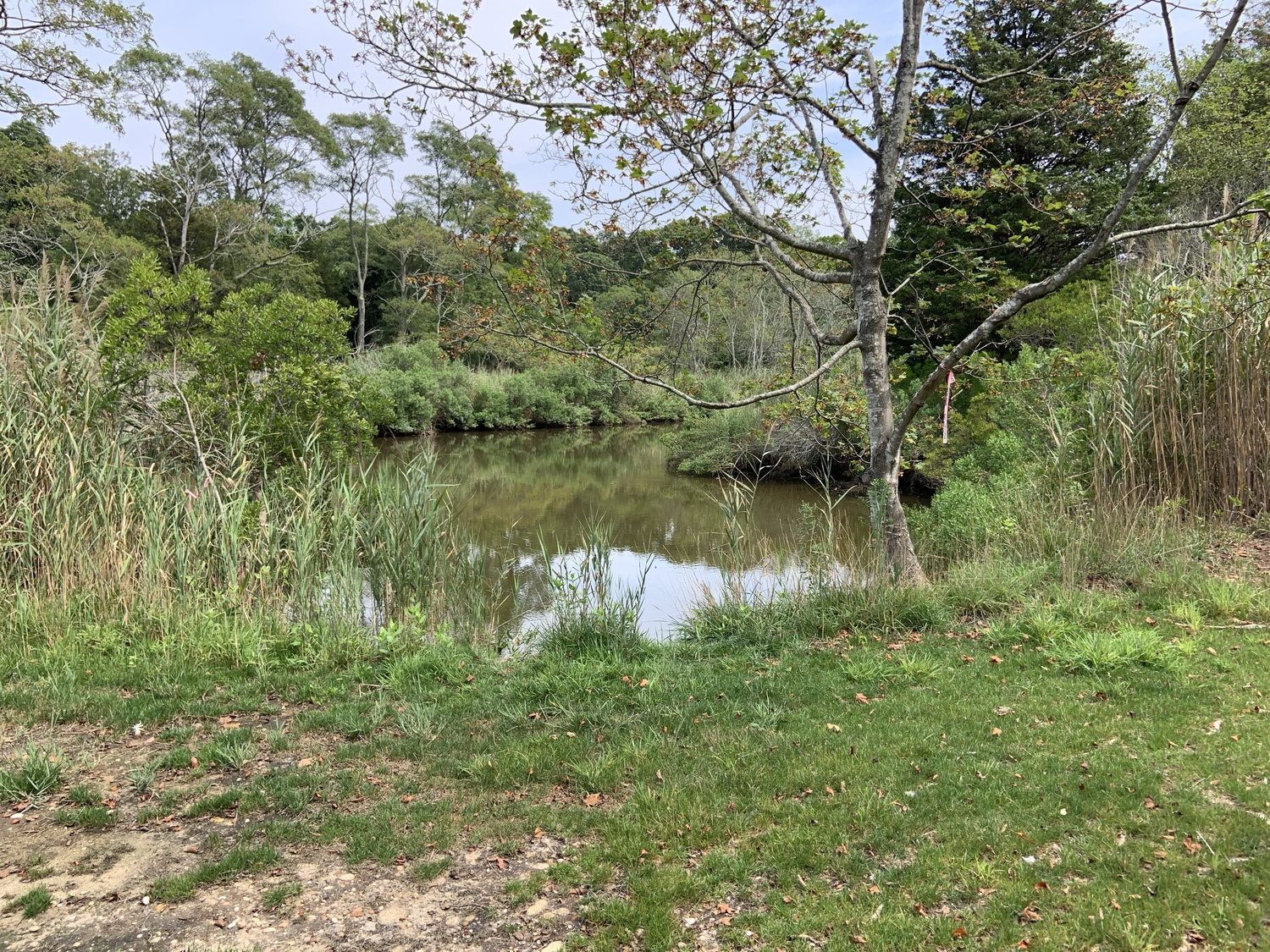
North Haven Village’s proposed plans for a new park on the former Lovelady Powell property on Sunset Beach Road and an adjoining parcel on Ferry Road once again came under fire when Southampton Town officials on Thursday, August 24, held the second of two informal hearings on the matter.
Although many more people attended the session at North Haven Village Hall than did at a similar hearing the week before at Town Hall, most speakers, including several who spoke at the first hearing, urged the town to limit development to the western portion of the property, where Powell’s house once stood, and protect Sebastian Pond on the adjoining parcel.
Thursday’s hearing took a personal turn, as several speakers directed pointed criticism at North Haven Mayor Chris Fiore, with some accusing him of running roughshod over a committee that was established to produce a master plan for the new park by ordering clearing and other site improvements without its input.
James Vos, who resigned earlier this year along with all but one of the members of that committee, went further, accusing Fiore of having illegally mowed a wetland buffer on his own property, which, he said, demonstrated why an independent committee was needed to oversee the development of the park.
Thursday’s hearing was once again chaired by Town Councilman Tommy John Schiavoni, a North Haven resident. He was joined by the town’s director of community preservation, Jacqueline Fenlon, and Daniel McCormick, an assistant town attorney.
On Friday, Schiavoni said the comments heard Thursday would be incorporated into a report with guidelines for the village to follow that will be issued in the coming weeks and referred to both the village and town boards.
Schiavoni reminded those who might have hoped that the property would be preserved completely in its natural state that it was purchased with money from the Community Preservation Fund to be used as a “village hamlet green,” a more intense use under CPF guidelines than if it were preserved as open space.
Although Michael Daly, a North Haven resident, praised the general idea for the park, he said the personal attacks reflected poorly on the community. “It has been kind of embarrassing to me, some of the backbiting, some of the name calling and finger pointing,” he said. “We are better than that in little, beautiful North Haven.”
But the finger pointing continued through the meeting.
Peter Lynch, whose comments were read by Susan Reed, said, “despite different opinions that may exist, our main goal is to get this right.”
He called for an inventory of the natural features and wildlife of the proposed park, and for environmental safeguards to be put in place as part of the plan.
Lynch also called for an independent body to oversee the park plan and said that the original committee had viewed Fiore’s input as “interference” in its work and suggested that the mayor formed a second committee, to focus solely on the design, “to exert more control” over it.
“It seems to some of us in the public that many of the people involved in the park development are all in cahoots with each other,” he added, referring to a write-in effort against Trustee Terie Diat, who has repeatedly questioned the mayor on the park plans.
North Haven resident Barbara Roberts said she, too, was concerned about the way the village was handling the park planning process. She said development of the site should be limited, which, she said, would be keeping with the wishes of Powell.
“For me, this is our heart and soul,” she said. “It is our rural vision and the least development that goes on there the better.
“People see us as a rural village. We don’t want to look like Greenwich, Connecticut,” she continued. “We don’t want to look like a pristine little village in old England. We want to live in a rural, wild place.”
Stella Sands, who was one of those who stepped down from the nonprofit committee, also raised concerns about the way the park was being planned, stating that a master plan, environmental review, and budget had not been in place before work had begun.
Although members of the original committee had sought the input of several landscape designers, who expressed an interest in bidding on the project, she said the mayor had given the work to Sam Panton, who volunteered his services, without asking the committee.
She also said that Fiore had given the committee conflicting information on whether the State Department of Environmental Conservation had issued “a letter of nonjurisdiction,” which would have freed the village from obtaining a DEC permit for clearing around Sebastian Pond, when he was only relying on an email that did not provide a definitive answer. The village has since formally asked the DEC for that okay.
Robert Remkus, who described himself as “the last man standing” when other members of the nonprofit committee resigned last spring, said he stayed on because he did not want to see its efforts derailed.
He pointed out how attitudes had changed over the years, saying that when the property surrounding Sebastian Pond, which was man-made in the 1970s, had been proposed for subdivision, the village asked the owner to fill the land. He also said there was concern about potential flooding when Sebastian Pond was connected to a vast swathe of wetlands on the east side of Ferry Road by a culvert.
“I think our committee has proceeded very cautiously,” he said. “I don’t feel what has been done is really that harmful. I think the park is beautiful.”